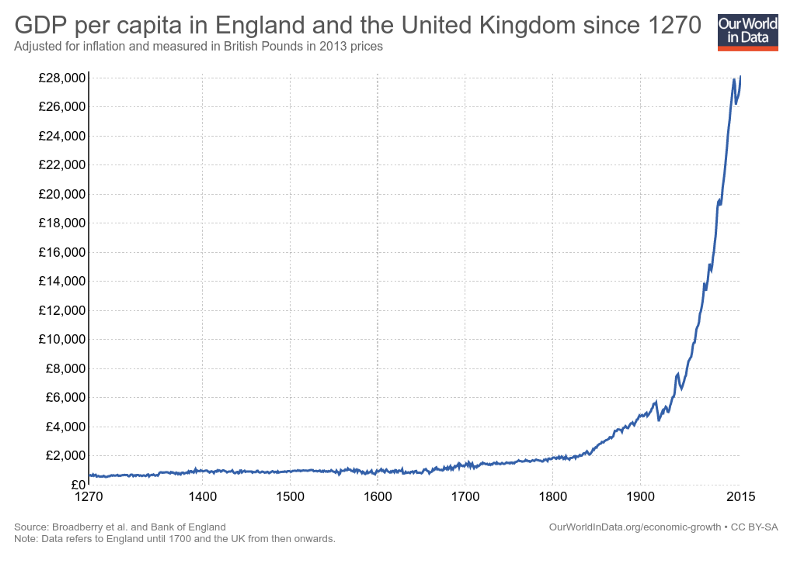Decentralized Revolution > Industrial Revolution

The industrial revolution hockey-stick, taken from https://ourworldindata.org/grapher/GDP-per-capita-in-the-uk-since-1270?tab=download
n the last 30 years, we have reduced global poverty by more than half.
This statement should absolutely blow your mind. It blows mine. That means that despite all the politics, controversy, scandal, crime, and corruption that have flooded our lives, the past 30 years has seen incredible progress.
Take a step further back and look at the last 200 years. Since 1800, we have seen the majority of humanity’s wealth created. And that trend line is still going up.
Progress of this massive scale is sometimes hard to see. Like a child waiting to grow up, slow and gradual improvements can be difficult to observe on a daily basis. And, much like the gloomy outlook on life Thomas Malthus adopted in 1798, we can get stuck postulating humanity’s demise while we stand on the cusp of the next “industrial hockey-stick” of progress.
The progress I refer to, of course, is decentralization.
It is quite easy to look hesitantly at brand-new innovation and see only the negatives. There is a realistic fear that decentralization, through blockchain and Ethereum, artificial intelligence, and robotics will put thousands if not millions of people out of their current jobs. I’m certain laborers during the Industrial Revolution felt the same way. But they could not imagine the enormous wealth and prosperity that would shortly follow.
Dylan Pahman, research fellow for the Acton Institute, puts this outlook into words well when he writes:
Think of how the assembly line and the automobile put most blacksmiths out of business. We should not minimize the harm done to blacksmiths, but we should also not overlook the great gains for the vast majority of people — not just the factory workers but everyone who benefited from cars and trucks through shipping, increased mobility, and so on.
I believe we should think about the coming decentralized revolution in the same way. It is easy for us to fear inevitable change, especially when it seems the only clear outcome is the loss of jobs. No one can blame Thomas Malthus for being so gloomy in 1798, and no one can blame our parents for despairing over poverty 30 years ago. But here we are.
Blockchain, Ethereum, Bitcoin, and decentralization isn’t just a hobby for the nerds anymore. These amazing products are helping real people in real time.
Blockchain is helping refugees verify their identity
The UN is using Ethereum to deliver aid
Cryptocurrency could help alleviate State debt
Tokenized Ecosystems are empowering independent artists
Blockchain could revolutionize the healthcare industry
These five diverse examples are just a few of the many ways decentralization is changing the world in which we live. Some people are skeptical of the enthusiasm of blockchain professionals, and decry the fact that this new tech could be applied “everywhere.” But I ask you, what if it can be?
Much like the blacksmiths looking glumly forward into the inevitability of the industrial revolution, I believe we are standing on the brink of another revolution. And much like them, we have the fog of the future clouding our vision. We can’t see what’s coming.
While I agree that it is foolish to be overly optimistic, our society tends to err in the opposite direction. All I’m asking you to consider is this: what if decentralization really is the next industrial revolution? What would you change? How would you get involved? Who would you support?
We may look back in a few short years and realize the hockey-stick of the industrial revolution pales in comparison to the decentralized revolution. Are you ready?
P.S. Enjoyed this article? Click the 💚 to help other people find it.
Decentralized revolution gonna be huge. Followed, upvoted. Everybody follow me as well, let's organise a giant network to gain more power at this platform!